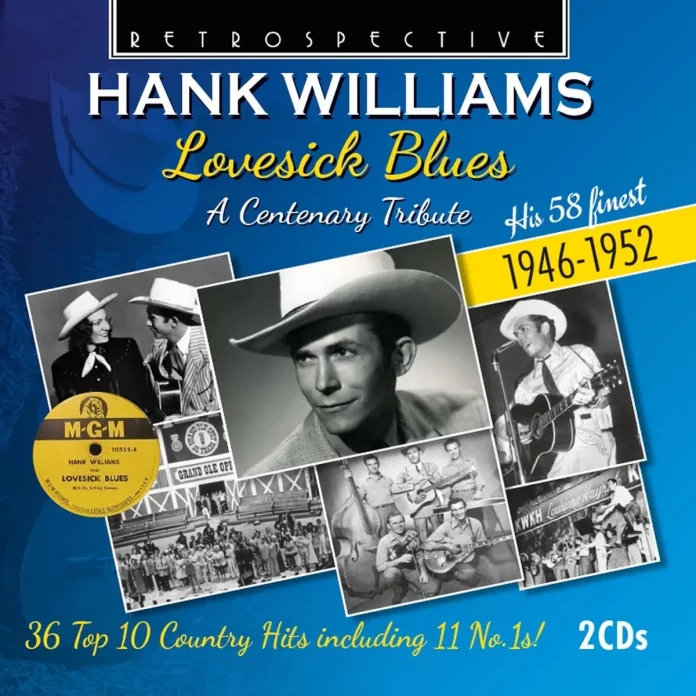When Hank Williams was born in Ohio on 17 September 1923, country music was beginning to take on a national presence, thanks in part to a record by Fiddler John Carson. Impressed by guitarist Rufe Tee Tot Payne and urged on by his first wife, Audrey, and his church-organist mother, Lillie, teenage Williams sang and played on street corners and even did a few radio dates on WSFA.
He was also fortunate in attracting the attention of music publisher and songwriter Fred Rose, who was an important figure in the career of the already successful Roy Acuff. Unfortunately, Williams firmly believed that he knew what was best for himself and sometimes went astray. Nevertheless, one thing remained constant: his songwriting. Not only was he always introducing new songs, they were of a consistently high standard.
Of the 58 songs heard here, Williams composed the music and wrote the words for 42 of them. Impressively, 11 of these reached No 1 in the country music charts. It is also striking that so many of his songs appealed then – and still do – to a far wider audience, thanks in part to contemporary recordings by artists including Frankie Laine, Jo Stafford and Tony Bennett.
As will be apparent from a glance down the titles, especially on CD2, not only does the music come readily to mind but so too do the words. In performance at the time, Williams also set standards. In the 2013 Chicago Shorts reprinting of a late 1990s biography of Williams, So Lonesome And The Creation Of Country Music, Richard A. Peterson draws attention to the manner in which pain from a lifelong spinal ailment prompted the singer to lean forward, thus creating an unintended but highly effective intimacy with his audience.
The instantly recognisable Williams was also distinctive in his vocal sound. Despite the growing preference for an earthy sound from country singers, not only was his voice high-pitched but he also sang with a naturally breaking half-yodel.
The closing years of his life saw Williams financially secure, thanks in large part to his publishing contracts, but he was also too dependent on alcohol. However, this did not affect his popularity. Indeed, his second marriage, to Billie Jean on 19 October 1952, attracted thousands of paying attendees.
What is most striking about Williams is that none of what he does is part of an act. He is authentic, an increasingly rare quality among singers today. Hank Williams was a success to the very end. When he died on his way to a gig on 1 January 1953, the currently top song on the country charts was his I’ll Never Get Out Of This World Alive.
Discography
CD1: Lovesick Blues; Calling You; Never Again Will I Knock On Your Door; Pan American; Move It On Over; I Saw The Light; Last Night I Heard You Crying In Your Sleep; Fly Trouble; I’m Satisfied With You; Rootie Tootie; I Can’t Get You Off Of My Mind; Long Gone Daddy; Honky Tonkin’; My Sweet Love Ain’t Around; The Blues Come Around; A Mansion On The Hill; I’ll Be A Bachelor ’Til I Die; There’ll Be No Teardrops Tonight; Please Don’t Let Me Love You; Jesus Remembered Me; Lost Highway; May You Never Be Alone; Mind Your Own Business; You’re Gonna Change, Or I’m Gonna Leave; Wedding Bells; I Just Don’t Like This Kind Of Livin’; My Bucket’s Got A Hole In It; Long Gone, Lonesome Blues
CD2: Why Don’t You Love Me?; Why Should We Try Anymore?; My Son Calls Another Man Daddy; Everything’s Okay; They’ll Never Take Her Love From Me; Nobody’s Lonesome For Me; Moanin’ The Blues; Cold, Cold Heart; Dear John; I Can’t Help It If I’m Still In Love With You; Howlin’ At The Moon; Hey Good Lookin’; My Heart Would Know; Ramblin’ Man; I’d Still Want You; I Heard That Lonesome Whistle; Crazy Heart; Half As Much; Baby, We’re Really In Love; Weary Blues From Waitin’; Honky Tonk Blues; Window Shopping; Jambalaya (On The Bayou); Settin’ The Woods On Fire; I’ll Never Get Out Of This World Alive; You Win Again; I Won’t Be Home No More; Your Cheatin’ Heart; Kaw-Liga; Take These Chains From My Heart (156.50)
Williams (v, g) with Hank Williams & his Drifting Cowboys, Hank Williams & The Country Boys, Audrey Williams, Hank Williams, Luke the Drifter. Various locations, 1946-1952.
Retrospective RTS 4407
















